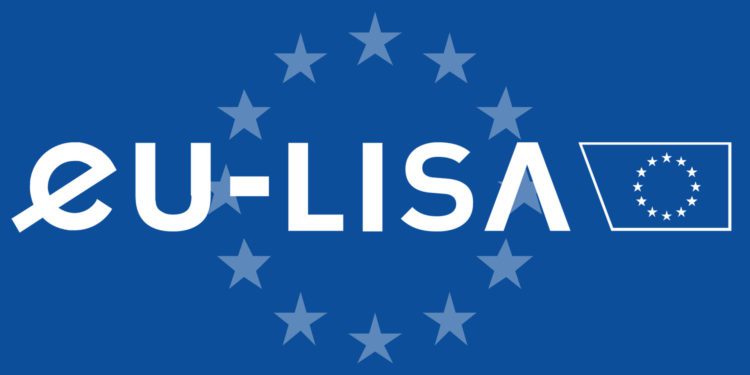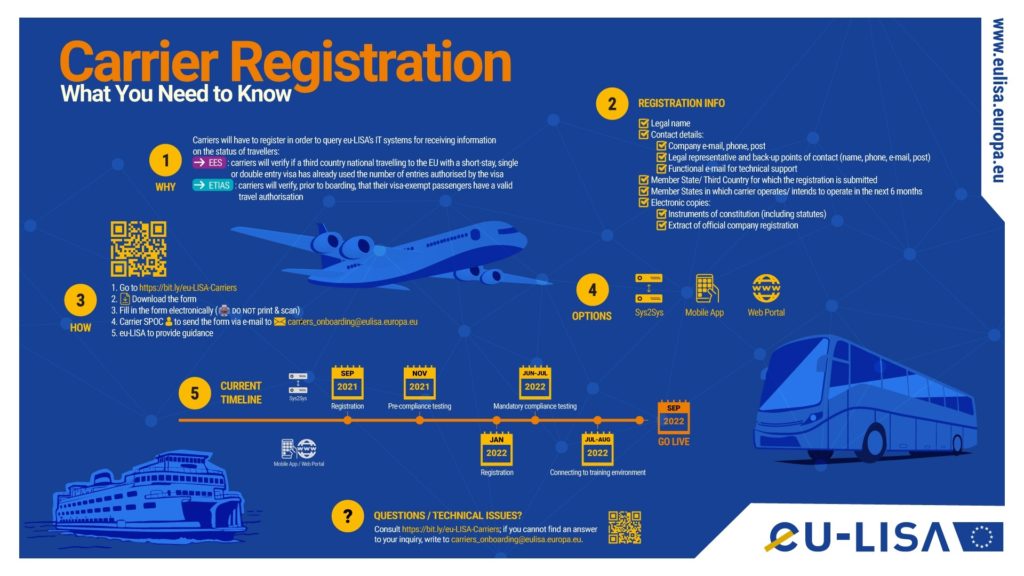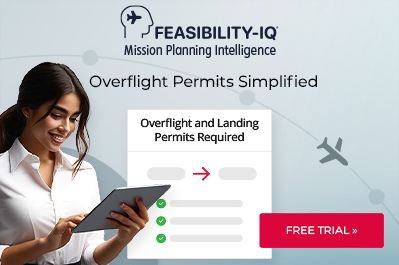eu-LISA Carrier Registration – Delayed Until 2024

Despite the sliding deadline and pending validation on applicability, our recommendation is still to register with eu-LISA and do it sooner than later. If you want assistance, we can help. Visit our website.
On Feb. 17, eu-LISA issued this notice urging operators to register with the agency ASAP if they plan to transport passengers into the EU, starting November 2022 and beyond, to comply with the EU’s new Entry/Exit System (EES) for traveler screening. eu-LISA is the European Agency responsible for managing the systems that verify travelers’ visa status for the 26 Schengen countries. The eu-LISA portal was created to shift some of the back-end administrative burdens of screening responsibilities and manually checking passenger visas to carriers. The EU’s notice was not widely circulated. As a result, many business aviation operators are unaware of the requirement or that it applies to them. We strongly advise not to wait until the last minute to comply with this regulation. eu-LISA will be bombarded with submissions as we approach that November deadline. Here’s everything you need to know about eu-LISA and how Universal can support operators with registration and EES traveler screening.
eu-LISA applies to both Part 91 and 135 operators
Based on our conversations with eu-LISA, it applies to ALL operators (Private AND Charter) transporting passengers into the EU. Operators are required to both register with eu-LISA and submit passenger screening info through the portal starting in November 2022. Even small Part 91 operators should register for eu-LISA if they ever plan to transport passengers to Europe. In April 2022, EBAA published this article, saying that it is seeking more clarity on this reg and to whom it applies. However, EBAA still recommends all its members, both Private AND Charter operators, register.
Phase 1: New Entry/Exit System (EES) postponed until 2024
The EU’s new automated Entry/Exit System (EES) was originally slated to go live on Sept. 1, 2022 but has been postponed until 2024. Once live, it will require operators to e-verify the visa validity of third-country nationals traveling to one of the 26 Schengen countries. In addition, the system will register the person’s name, type of the travel document, biometric data (fingerprints and captured facial images), and the date and place of entry and exit, in full respect of fundamental rights and data protection. It will also record refusals of entry. EES will replace the current system of manual stamping of passports, which is time-consuming, does not provide reliable data on border crossings, and does not allow a systematic detection of over-stayers (travelers who have exceeded the maximum duration of their authorized stay).
Phase 2: ETIAS (European Travel Information and Authorisation System) goes live 2024
ETIAS requires operators to e-verify the status of travel docs of visitors to one of the 26 countries that do not require a visa. This program is similar to the U.S Electronic System for Travel Authorization (ESTA). ETIAS will go into effect in sometime in 2024 after implementation of Phase 1 EES. All visitors who currently do not need a visa to enter Europe will be expected to apply for an ETIAS travel authorization. Currently, there are 60 countries that will need to apply for an ETIAS visa waiver when visiting the Schengen Zone. However, ETIAS will likely be available to more countries in the future. The ETIAS visa waiver has been designed for up to 90 days for short-term stays. Tourism and business travelers will be expected to have an approved ETIAS when traveling to any Schengen member countries.
eu-LISA will likely apply to business-purpose flights
Our Global Regulatory Services team heard from our participation in the eu-LISA Working Group for Carriers on July 6, 2022, that eu-LISA WILL likely apply to private business-purpose flights, based on the different flight scenarios we provided to the agency. We’ll report when an official position on this is released.
Despite the sliding deadline and pending validation on applicability, our recommendation is still to register with eu-LISA and do it sooner than later. If you want assistance, we can help. Visit our website.
Before using EES and ETIAS, operators must first register in the eu-LISA portal
 The eu-LISA registration process is time-consuming and requires providing legal entity documentation for the aircraft operator – among other things. So far, we’ve seen lots of back and forth between operators and the authorities. Therefore, submitting the correct information is critical to avoid a messy, drawn-out process.
The eu-LISA registration process is time-consuming and requires providing legal entity documentation for the aircraft operator – among other things. So far, we’ve seen lots of back and forth between operators and the authorities. Therefore, submitting the correct information is critical to avoid a messy, drawn-out process.
Universal Global Regulatory Services can help

Our Global Regulatory Services team will provide consulting and oversight for establishing your eu-LISA carrier account – helping you save time, avoid mistakes, and ensure you have your account set up before the deadline. As part of the application process, Universal will be designated as a Carrier Service Provider on your account, which gives you the option to have Universal manage your eu-LISA Entry-Exit-System (EES) and ETIAS traveler screening submissions in the future. If you want our help with this, please complete this form and select “eu-LISA” from the list.




